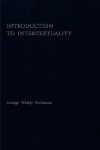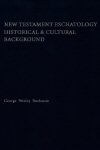George Wesley Buchanan Collection (9 vols.)
Digital Logos Edition
Overview
Bible scholar George Wesley Buchanan is one of the premier proponents of intertextual criticism, a point of view examining texts in light of other texts. Using various Scriptures and other ancient texts, he applies this discipline to various books of Bible in this collection, such as Matthew, Daniel, and Revelation, providing priceless context and commentary. This 9-volume collection also includes Buchanan’s concise work on what defines intertextuality as a valid form of Biblical interpretation. Also containing studies on Messianic movements throughout history, this collection is essential for any serious student, professor, or layperson of the Bible wishing to gain insight from all of Scripture on various works of the Bible.
Featuring nearly 4,000 pages of solid biblical criticism and interpretation from one of the top twentieth-century Bible scholars, this collection is more accessible than ever before. The studies and commentaries can be linked with your favorite Bible translations and searches for various intertextual topics are instantaneous with the click of a mouse.

- Nearly 4,000 pages of biblical criticism
- Valuable commentary on Matthew, Daniel, Revelation, and other books of the Bible
- Includes introductions, conclusions, and appendices to guide research and study
- Title: George Wesley Buchanan Collection
- Author: George Wesley Buchanan
- Volumes: 9
- Pages: 3,934
- Christian Group: Methodist/Wesleyan
- Topic: Biblical Studies
- Biblical and Theological Insights from Ancient and Modern Civil Law
- The Book of Daniel
- The Book of Hebrews: Its Challenge from Zion
- The Book of Revelation: Its Introduction and Prophecy
- The Gospel According to Matthew (Vol. 1)
- The Gospel According to Matthew (Vol. 2)
- Introduction to Intertextuality
- Jewish Messianic Movements
- New Testament Eschatology: Historical and Cultural Background
This title is included in the following collections
You can save when you purchase this product as part of a collection.
Logos 8 Methodist & Wesleyan G...
$849.99$849.99Logos 7 Methodist & Wesleyan G...
$849.99$849.992025 Wesleyan Platinum
$1,499.99$1,199.99Logos 8 Methodist & Wesleyan P...
$1,499.99$1,499.99
- $1,499.99
- $1,499.99
- $2,999.99$2,249.99
- $2,999.99
- $4,749.99$3,562.49
- $23,999.99$17,999.99
- $21,749.99
- $24,999.99

This volume examines legal concepts in the Scripture and the technical implications involved. Comparing in both scripture and courtroom such concepts as covenant, apostle, witnessing, prayers, calls to worship compared with court room commands, the architecture of ancient temples and that of court rooms, exegesis, rhetorical arguments in the Bible and court, incarnation, and more, this book will stir the imaginations of scholars to find still further insights, questions and answers. The wisdom of the courtroom is an important ingredient for understanding biblical interpretation and Jewish and Christian theology.

Among the insights discovered in this commentary is the realization that Daniel is not unified, but is a collection of individual dramas. Furthermore the author aims to demonstrate that Daniel was not initially a prophecy; it is not pacifistic; and probably should not be called apocalyptic.

The Book of Hebrews: Its Challenge from Zion
- Author: George Wesley Buchanan
- Publisher: Wipf & Stock Publishers
- Publication Date: 2006
- Pages: 509
Buchanan offers his intertextual research on the book of Hebrews in this volume. With over 500 pages, this is an in-depth resource and commentary on what the book of Hebrews has to offer to modern readers, by focusing on Old Testament texts as well as other New Testament works that contributed to the writing of Hebrews. By reading Buchanan’s contextual and thorough volume, the reader will have a greater understanding of the scope and meaning of the book of Hebrews.

In this substantial volume, academic Buchanan turns his attention to the book of Revelation, presenting his remarks from an intertextual point of view. Taking each chapter of Revelation at a time, Buchanan examines the text and literary ramifications, and then gives insightful commentary. Comparing to other Scripture texts as well as historical and social contexts, Buchanan’s work on Revelation is essential to any student of the Apocalypse. He also provides an introduction to intertextual discourse, conclusion, and a list of helpful appendices.

Covering the book of Matthew, this is one of a series of volumes of biblical intertextual commentary. Professor George Buchanan's methodology of intertextuality places the biblical text opposite all of its sources, so as to provide a more comprehensive study of Scripture. Buchanan systematically covers each chapter of Matthew going over the following topics:
- Parallels between Matthew and the Hexateuch
- Text
- Technical Details
- Commentary
Buchanan’s commentary is more technical in nature, rather than doctrinal. His approach will provide valuable context, using the Old Testament, other ancient texts, as well as a myriad of other resources.

The second volume of Buchanan’s commentary on this gospel includes essential scholarship on Matthew chapters 13—28. Like the first volume, The Gospel According to Matthew (Vol. 2) presents key intertextual study on this first gospel of the New Testament. In customary fashion, Buchanan’s analysis is concise and systematic, providing in-depth research and insight for students and scholars of all levels.

In this slim yet succinct volume, Buchanan introduces the student to the concept of intertexuality—using Scripture to illuminate Scripture. Using several examples from his own studies that span decades, Buchanan shows the practicality and accuracy of this method of interpretation. For instance, he compares the story of the Exodus with several passages from the book of Isaiah, showing how the one is actually a sermon based on the other. This is a necessary book for anyone interested in interpretation of the Scriptures and how we know what we know about the Bible.

In this eschatological work, Buchanan outlines and details the significance of Messianic developments throughout history. Focusing on themes of revelation and redemption which run throughout all Messianic works, Buchanan introduces the topic and then provides various works throughout history of Messianic documents as well as invaluable commentary on each work. The chapters are divided by topics such as the import of Jerusalem and literary style. Academic yet accessible, Buchanan makes this topic clear and concise. The reader will emerge with a greater understanding of Messianic prophecy and the Apocalypse, and how they relate together.
Table of Contents
- Introduction
- History and Doctrine
- Prophetic Movements
- Poetry and Prayer: The Voice of An Exiled People
- Messianic Expectations
- The Holy City
- The Day of Vindication
- Redemption in the Talmud and Midrash
- History and Apocalypse
- Eschatological Legends
- The Last Days
- Heaven and the Land
- Conclusions

Instead of opting for one of the standard explanations of eschatology, this study looks for the origin of the concept in antiquity, requiring an examination of the Hebrew Scripture, the New Testament, the Dead Sea Scrolls, rabbinic literature, the church fathers, and surrounding Greek literature and history. The text involves a study of the legal, hermeneutical, cultural, historical, and political thought forms of ancient expectations. Beliefs and practices related to eschatology are examined from 8th-century Isaiah to the end of the Crusades in relationship to the Promised Land and the doctrine of redemption. Insights are employed to understand such New Testament problems as the Battle of Armageddon and the mystical number 666. The book also seeks to uncover the contemporary consequences of this dynamic doctrine.
George Wesley Buchanan is Professor Emeritus of New Testament Studies at Wesley Theological Seminary. He is also part of the Advisory Board for the Biblical Archaeology Review.